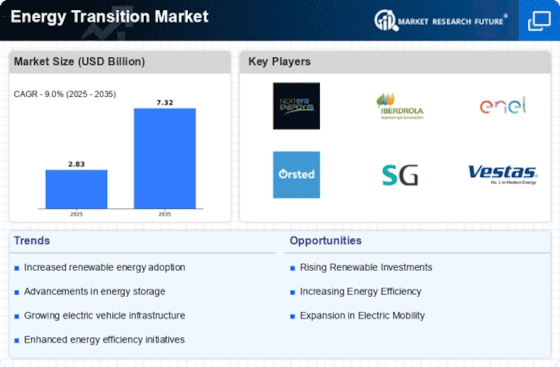Top Industry Leaders in the Energy Transition Market
*Disclaimer: List of key companies in no particular order
Top listed companies in the Energy Transition industry are:
Exelon Corporation, Duke Energy Corporation, Southern Company, American Electric Power, Edison International, Repsol, Brookfield, Orsted A/S, NextEra Energy, Enel
The global energy transition market is ablaze with opportunity, propelled by rising climate concerns, ambitious decarbonization goals, and accelerating technological advancements. renewable energy sources like solar and wind, energy efficiency solutions, electrification infrastructure, and emerging technologies like hydrogen fuel cells.
Key Player Strategies:
• Energy Majors: Traditional oil and gas giants are adopting a two-pronged approach: divesting carbon-intensive assets and aggressively investing in renewables. BP's acquisition of Lightsource BP and Shell's focus on offshore wind are prime examples.
• Renewable Energy Developers: Established players like Ørsted and Iberdrola are capitalizing on their experience and scale to secure large-scale projects and expand across geographical markets. Meanwhile, up-and-comers like Voltalia and Green Yellow are carving niches in distributed generation and rooftop solar.
• Technology Innovators: Tesla, Siemens Gamesa, and Vestas are pushing the boundaries of efficiency and cost reduction in wind and solar technologies. Battery storage companies like CATL and BYD are playing a crucial role in grid stability and enabling increased renewable energy integration.
• Utilities & Grid Operators: Facing disruption from decentralization, utilities are transforming their business models. Investments in smart grids, microgrids, and energy storage are key for them to remain relevant in the evolving energy landscape.
Market Share Analysis Factors:
• Technology Cost and Performance: Cost competitiveness of renewable energy sources compared to fossil fuels is a critical factor. Technological advancements in wind turbine design, solar panel efficiency, and battery storage are continuously shifting the landscape.
• Government Policy and Regulations: Policy frameworks encouraging renewable energy adoption, carbon pricing mechanisms, and subsidies play a significant role in shaping market dynamics. The EU's Fit for 55 package and China's carbon neutrality ambitions are driving significant renewable energy deployment.
• Financial Landscape and Investment Appetite: Availability of financing mechanisms like green bonds and carbon capture credits directly impacts project feasibility and market growth. Institutional investors are increasingly prioritizing ESG considerations, driving capital inflows into the clean energy sector.
• Geographical Differences: Regional disparities in resource availability, existing energy infrastructure, and regulatory environments create diverse market opportunities. China's dominance in solar manufacturing, Europe's offshore wind potential, and the African continent's immense solar resource are examples of regional variations.
New and Emerging Trends:
• **Green Hydrogen: **The potential of hydrogen as a clean fuel carrier across sectors like transportation and heavy industry is attracting significant investments. Companies like Air Liquide and Linde are actively developing hydrogen production and distribution infrastructure.
• Digitalization and AI: Advanced analytics and artificial intelligence are optimizing grid operations, enhancing energy forecasting, and enabling efficient energy management. Companies like Google Nest and GridBeyond are leading the charge in smart home and grid intelligence solutions.
• Decentralization: The rise of rooftop solar, microgrids, and peer-to-peer energy trading is empowering consumers and creating new market opportunities for distributed generation and energy management platforms.
The energy transition market is witnessing a dynamic shift from established incumbents adapting to new entrants disrupting the space. Collaboration and partnerships are becoming increasingly crucial, as no single player possesses all the necessary skills and resources to navigate this complex landscape. The ability to innovate, scale rapidly, and adapt to evolving market conditions will be key to success in this fast-paced and dynamic market.
As the world's focus on sustainability intensifies, the energy transition market presents a treasure trove of opportunities for companies across the value chain. Understanding the competitive landscape, key player strategies, and emerging trends will be crucial for companies to seize this unique moment and contribute to a cleaner and more secure energy future.
Latest Company Updates:
Duke Energy Corporation:
• September 19, 2023: Announced plans to retire 55 GW of coal-fired generation by 2035, exceeding their previous target. (Source: Duke Energy press release)
Southern Company:
• September 15, 2023: Launched a new clean energy subsidiary, Southern Renewables, to focus on solar and wind development. (Source: Southern Company press release)
American Electric Power (AEP):
• September 8, 2023: Announced plans to invest $8 billion in renewables and battery storage over the next three years. (Source: AEP press release)
Edison International:
• October 6, 2023: Received approval from California regulators to acquire Bear Valley Electric, expanding its renewable energy portfolio. (Source: Edison International press release)










